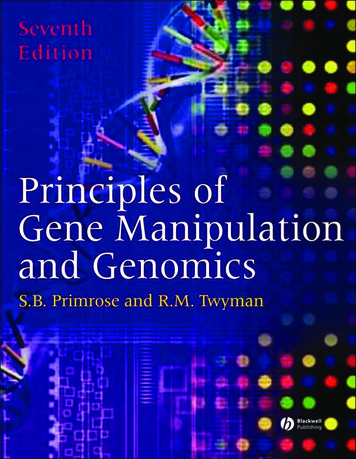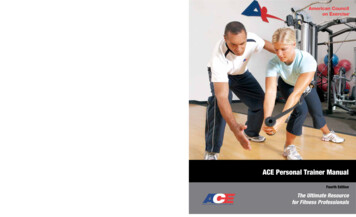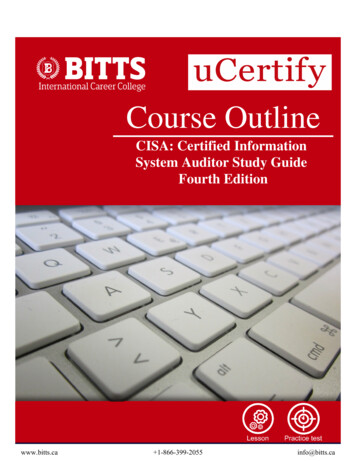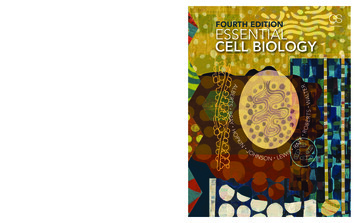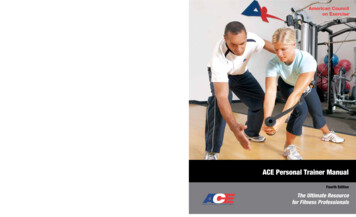
Transcription
Cambridge Latin CourseThe North American Fourth EditionScope & SequenceCONTENTSUnit 1 Hardback: 0-521-78228-7Paperback: 0-521-00434-9Grammar and Sequence PatternsNarrative Scope and SequenceUnit 2 Hardback: 0-521-78229-5Paperback: 0-521-00430-6Grammar and Sequence PatternsNarrative Scope and SequenceUnit 3 Hardback: 0-521-78230-9Paperback: 0-521-89470-0Grammar and Sequence PatternsNarrative Scope and SequenceUnit 4 Hardback: 0-521-78231-7Paperback: 0-521-53414-3Grammar and Sequence PatternsNarrative Scope and Sequence
IntroductionThe Cambridge Latin Course was first developed in the 1960s in Britain. The decisionto adopt a reading approach was based on new theories of language learning and inresponse to a changing educational climate. The decision to set the Course in the earlyEmpire was based on the belief that its social and political structure was not only morecolorful and widespread than that of the Republic but also easier for students tounderstand and richer in source materials for teachers.The Course has two major objectives:1To teach comprehension of the Latin language through practice in reading it;2To develop, through these readings, the students’ understanding of the social andpolitical history of the Romans.The Course does not present the Latin language as an abstract linguistic system or merelyas an exercise for developing mental discipline. Instead, it presents the language as themedium of the great culture and literature that molded it.The accompanying Scope and Sequence summarizes not only the grammaticaldevelopment of the Course but also the narrative and cultural context. This is noaccident. By integrating culture with language, the Course teaches the skills of reading,comprehension, and critical appreciation.Teachers can use Scope and Sequence for course planning or curriculum mapping. Inone convenient location, it offers a quick synopsis of the story line, the socio-historicalbackground, and the linguistic presentation. Each grammatical point is listed under itsfirst appearance. The word “note” indicates a formal explanation in the text.Teachers already familiar with previous editions of the Course, may find the Scope andSequence useful for identifying changes in the Fourth Edition.Cambridge University Press40 West 20th StreetNew York, NY tion/latin/
Unit 1: Grammar and Sentence PatternsSTAGEGRAMMATICAL POINTSEXAMPLESENTENCE PATTERNEXAMPLEUNIT 1Stage 1Stage 2Stage 3nominative singular: declensions1, 2, 3Clēmēns est in hortō.NOM est predicate(N/ADJ)Caecilius est pater.3rd person singular present: allconjugations (including est )Metella in ātriō sedet.NOM est adv. prep. phraseCaecilius est in tablīnō.predicate adjectivecoquus est irātus.NOM adv. prep. phrase Vpater in tablīnō scrībit.predicate nominativeCaecilius est pater.ablative singular in prepositionalphrasesCerberus est in viā.nominative and accusativesingular (declensions 1, 2, 3)noteamīcus canem salūtat.NOM ACC Vamīcus Caecilium salūtat.superlative adjectiveGrumiō est laetissimus.NOM ACC V et VGrumiō triclīnium intrat etcircumspectat.adverbs (from 1st & 2nd decl.adj.)coquus in triclīniō magnificē cēnat.adverbs (from 3rd decl. adj.)ancilla suaviter cantat.V NOMrespondet Pantagathus.differentiation of 1st, 2nd, 3rddeclensions noteattributive adjectivemagnus leō est in pictūra.accusative singular inprepositional phrasespictor ad vīllam venit.vocative casesalve, tonsor!accusative of 4th declensionCaecilius ad portum ambulat.
Stage 4Stage 5Stage 6Stage 71st & 2nd person singularpresent (all conjugations,including sum ) notequid tū pingis? ego leōnem pingō.interrogative word (quis, quid,cūr, ubi) NOM Vquid tū habēs?adestego nāvem habeō, sed nāvis nōn adest.interrogative word V NOMquis es tū?accusative of 5th declensiontu rem non probas.mēleō mē spectat.questions with no interrogativewordtū ānulum habēs?3rd person plural present (allconjugations, including sum )notepuellae sunt in vīa.NOM et NOM Vfēminae et puellae sunt in turbā.nominative plural (declensions 1,2, 3) notesenēs dormiunt.2nd declension: r -stem nounspuer est in vīa.abestLucriō abest!3rd person singular and plural,imperfect and perfect (v -stems)noteservī per viam ambulābant.canis subitō lātrāvit.NOM subord. adv. clause ACC Vcoquus, quod erat laetus, cēnamoptimam parāvit.erat, erant noteClēmēns erat fortis. servī erant laetī.NOM ACC et ACC VClēmēns Caecilium et Metellamquaesīvit.suppression of subjectpaene lacrimābat.perfect tense (other than v stems) noteamīci optimum vīnum bibērunt.tandem surrēxērunt.ACC V (suppression ofsubject)vīllam intrāvit.tēego tē laudō, quod mē dīligenter cūrās.hicQuīntus, postquam ad hanc vīllamvēnit, ātrium intrāvit.illeille centuriō erat versipellis!
Stage 8oblique cases of isgladiātor tamen dominum ferōciterpetīvit et eum ad amphitheātrumtrāxit.questions with numnum Quintus aprum timet?accusative plural notepuellae iuvenēs salūtavērunt.superlative adjective noteStage 9dative singular and plural notemercātor fēminīs togās ostendit.NOM DAT ACC Vego, tū (nominative, dative, andaccusative) noteego tibi grātiās maximās ago.personal pronouns as subjectsgradually suppressedQuīntus servō pēcuniam dedit.Marcellus Metellae togam trādidit.reduplicated perfectStage 10sēāthlētae in palaestrā sē exercēbant.eōcīves cotīdiē ad thermās ibant.ferōservī oleum et strigilēs ferēbant.1st and 2nd person pluralpresent (including sum ) notenōs Graecī sumus sculptōrēs. nōsstatuās pulchrās facimus.NOM DAT et DAT ACC VQuīntus rhētorī et amīcis argūmentumexplicāvit.comparative adjective notenōs sumus callidiōrēs quam vōs.NOM est comparative ADJ quamurbs Rōma est maior quam omnēsaliae urbēs.comparison with quamGraecī sunt meliōrēs quam Rōmānī.nōbis, vōbīsnōs Rōmānī vōbīs pācem damus.questions with -nevōsne estis contentī?imperative, singular and pluraldā mihi statuās! abīte!in accusativeThrasymachus librum in piscīnamdēiēcit, quod īrātissimus erat.
Stage 11Stage 12intransitive verbs (crēdō, faveō,placet) dative notenōs mercātōrī favēmus.nōs, vōs (nominative , dative, andaccusative) notedei nobis imperium dant.placet notemihi placet.different ways of askingquestions notequō festīnās, Grumiō? num tū Afrōfavēs?mēcum, tēcumtū mēcum vēnīs?sibiQuārtus sibi dīxit, "frāter meus eststultissimus."1st and 2nd person singular andplural, imperfect and perfectnotetū sonōs audīvistī. ego tremōrēs sēnsī.1st and 2nd person singular andplural imperfect of sum notesollicitī erant.ablative plural in prepositionalphrasesfēminae cum īnfantibus per urbemfestīnābant.NOM DAT Vnōs candidātō nostrō nōn crēdimus sedfavēmus.expansion of the subordinateclauses to contain DAT ACC VCaecilius, postquam Clēmentī ānulumsuum trādidit, statim exspīrāvit.
Unit 1: Narrative Scope and SequenceSTAGEDATE A.D.SETTINGCHARACTERSINTRODUCEDSTORY LINECULTURALBACKGROUNDUNIT 1Stage 179Pompeii: Caecilius' houseLucius Caecilius Iucundus, wifeMetella, son Quintus, slavesClemens and Grumio (cook),dog CerberusCerberus steals food.Caecilius and Metella andtheir household; houses inPompeiiStage 279Pompeii: Caecilius' houseamicus , ancillaDinner party; Grumio eats, drinks, flirts, ashost and guest sleep.A typical day: clothing,foodStage 379Pompeii: ForumPantagathus (barber), Celer(painter), Syphax (slave-dealer),Melissa (slave-girl)Celer paints Hercules at Caecilius' house;Pantagathus, angry at poet, cuts customer;Caecilius buys Melissa from Syphax; Metelladoes not like Melissa.The town of PompeiiStage 479Pompeii: ForumHermogenes (merchant)Hermogenes borrows money from Caecilius,refuses to repay; court scene; Caecilius wins.The ForumStage 579Pompeii: TheaterActius (actor), Poppaea (slavegirl), Lucrio (her master)Holiday play attended by all Caecilius'household except Grumio. Poppaea hastrouble getting Lucrio to go to play so shecan meet her boyfriend ( Grumio).The TheaterStage 679Pompeii: Forum, tavern,Caecilius' houseFelix (freedman)Quintus rescues Clemens and Grumio fromdog, witnesses fight between farmer andGreek merchant, meets Felix in tavern,invites him home; story is told of how Felixearned his freedom by saving the infantQuintus from a kidnapper.Slaves and freedmenStage 779Pompeii: Caecilius' houseDecens (guest), ghost of Pugnax(gladiator), Decens' two slavesFelix, at Caecilius' banquet, tells story ofwerewolf. Decens fails to arrive, because hehas been murdered.Burial customs; Romanbeliefs about life afterdeathwoods on Mt. Vesuvius;Pompeii: Caecilius' houseStage 859 (sic)Pompeii: AmphitheaterQuintus and Felix go boar-hunting; Quintuskills boar. Metella consoles Melissa, who hasbeen scolded by Grumio and Clemens.senator RegulusRegulus gives gladiatorial show, which endsin a riot between Nucerians and Pompeians.Amphitheater; gladiatorialshows; the riot at Pompeii
Stage 979Pompeii: bathsMilo (athlete); Sceledrus,Anthrax (public slaves)Quintus' birthday visit to baths withCaecilius. Milo hurls discus; Quintus throwsit and damages Milo's statue. Sceledrus andAnthrax apprehend a toga thief.Pompeii: the ForumMarcellus (mercator )Metella and Melissa buy Quintus a new togafor his birthday.Pompeii: schoolPompeii: Alexander'shousePompeii: tavernTheodorus (teacher), Alexander(friend of Quintus), Diodorusand Thrasymachus (brothers ofAlexander)Debate: "Greeks are better than Romans";Alexander wins: "Romans are imitators."Quarrel over 3 presents for Alexander's 2brothers: Quintus settles by taking one forhimself.Syphax pays tavern bill with old Egyptianring; bad luck comes to all. Grumio andPoppaea eventually find it. What will happento them?Education; writingmaterialsThe BathsStage 1079Stage 11March 79Pompeii: around the town(i.e. house of Marcus andQuartus, near theAmphitheater, Caecilius'house, the Forum)Marcus and Quartus (brothers),Sulla (sign-painter), Holconiusand Afer (candidates)Sulla makes profit by painting signs forbrothers advertising their candidates. Grumiotries to earn money by voting illegally.Clemens earns 10 denarii by rescuingCaecilius from riot, goes out with Poppaea.Local government andelectionsStage 12August 24,79Nuceria, Pompeii: day oferuptionJulius (friend of Caecilius)Turmoil: Clemens saves Julius, who thenflees. Clemens finds Caecilius dying.Caecilius orders Clemens to find Quintus andgive him signet ring. Caecilius dies, Clemensdeparts, Cerberus stands guard.The eruption of Vesuvius;excavation of Pompeii
Unit 2: Grammar and Sentence PatternsSTAGEGRAMMATICAL POINTSEXAMPLESENTENCE PATTERNEXAMPLEUNIT 2Stage 13present active infinitive notenōs dē hāc coniūrātiōne audīrevolumus.conjugations of verbs notepresent tense of possum, volō,nōlo notede coniurātione audire volumus.-que notepuēri puellaeque in prīmo ōrdinestābant.questions with nōnne?nōnne Cervīx arātōribus praeest?perfect participle passivedominus est vulnerātus.clauses with ubi ( "when"),simulac/simulatque, quamquamBrēgans, simulac Salvium vīdit,"domine! domine!" clāmāvit.nominative singular of 2nddeclension neuter nounsubi est vīnum?accusative plural of 2nddeclension neuter nounsSalvius duo aedificia vidit.sēcumBrēgans in mediīs servīs stābat: canemingentem sēcum habēbat.appositionhospes erat Pompēius Optātus, virbenignus.accusative predicate adjectiveAlatorem audacem interfecērunt.perfect of vōlopostrīdiē Salvius fundum īnspicerevoluit.perfect of sumquis fuit neglegens?(NOM) INF VVolūbilis cēnam optimam coquerepotest.omission of verb in second oftwo clauses.ūnus est nocēns, cēterī innocentēs.
Stage 14Stage 15ablative singular and plural notehaec villa ab urbe longe abest.decōrum, etc. est DAT (ACC) INFdifficile est mihi magnam amphoramportāre.prepositions noteSalvius e villa contendit.agreement of adjective in caseand number noteamphorae gravēs sunt.accusative of extent of timetotam diem laboravī.imperfect of volō, nōlō, possumMarcia urnam vix portāre poterat,quod anus erat.infinitive as subjectnecesse est mihi pavīmentum lavāre.vocative in -īSalvī, audī!nōlīnōlī lacrimāre!present participlecoquus, ērubēscēns ad cubiculumrevēnit.ipsetū ipsa hanc vīllam ēlēgistī.relative clauses notevīnum, quod ancillae ferēbant, erat inpaterā aureā.NOM Relative clause Vsenex, quī scēptrum tenēbat, erat rēxCogidubnus.agreement of adjective by gendernotesacerdotes effigiem ceratam portabant.omission of verb in first of twoclausesRegnēnsēs laetī, Cantiacī miserī erant.infinitive dēbēoquid facere dēbēo?nominative plural 2nddeclension neuter nounsmulta saxa minora sub undis latent.accusative singular and plural 3rddeclension neuter nounspost haec certamina Cogidubnuscertamen navale nuntiāvit.appropinquo dativeDumnorix saxo appropinquāvit.
Stage 16Stage 17Stage 18pluperfect notein hortō erant multī flōrēs, quōsCogidubnus ex Italiā importāverant.DAT ACC et ACC Vursae cibum et aquam dabat.infinitive audeōsed ursam tractāre nōn audēs!relative clause in sentences withsubject omittedibi servum, quī tam fortis et tam fidēlisfuerat, līberavī.increasingly varied position ofthe relative clausein aulā erant multae pictūrae, quāspictor Graecus pīnxerat.ex ovō,quod servī in mēnsam posuerant,appāruit saltātrīx.questions with num , -ne , nonnenotenonne tu hospitibus spectaculum darevis?genitive singular and plural noteprō templō Caesaris erat āra.DAT Vpuerō respondī.obstō dativein triviīs magna multitūdo nōbīsobstābat.ACC NOM Vita mercātōrem fortūna servāvit.clauses with sīcuthoc mōnstrum, sīcut pīca, rēs fulgentēscolligere solet.increased complexity insubordinate clausein armārio erant quīnque fūstēs, quōsDiogenēs extrāxit et nōbīs trādidit.soleō, coepī, melius est infinitivenunc sacerdōtēs in ārā sacrificiumfacere solent.nesting of prepositionDiogenes media in casa stabat.neuter nouns (singular andplural) noteBarbillus multa aedificia possidēbat.NOM/ACC genitive Vofficīnam Eutychī intrāvit.ACC V NOMtabernam tuam dīripiunt Eutychus etoperae.ACC DAT Vhanc tabernam Clēmentī emere volō.ACC NOM Vmox plūrimōs amicōs Clēmēnshabēbat.4th and 5th declension nounsnoteclauses with ut ( "as")haec taberna, ut dīxī, prope templumdeae Isidis erat.
increased complexity ofsentence structure:i) "branching" of onesubordinate clause out ofanotherii) "nesting" of one subordinateclause inside anotherStage 19Stage 20hic, ille notehaec fēmina est Galatēa.ille vir est Aristo.imperatives including negativenoteiuvenes! cedite! nolite nobis obstare!vocative singular and plural notemarīte! ēmovē hōs iuvenes!fīō predicate nominativeaqua līmōsior fiēbat, harundinēsquedēnsiōrēs.present active participle noteancillae prope lectum stabant,lacrimantes.is, ea, id notePetrō, postquam dē vulnere Barbillīaudīvit, statim ad vīllam eiusfestīnāvit.genitive of descriptionastrologus, quī in vīllā Barbillīhabitābat, erat vir ingeniī prāvī.increased complexity ofsentence structure:iii) "stringing" of two parallelsubordinate clausesdīligenter labōrābant, quod aderatvīlicus, quī virgam vibrābat.ubi ā templō, in quō cēnāverat, domumredībat, amīcum cōnspexitaccurrentem.servī, quī Barbillum portābant, ubicubiculum intrāvērunt, in lectum eumlēniter posuērunt.
Unit 2: Narrative Scope and SequenceSTAGEDATE A.D.SETTINGCHARACTERSINTRODUCEDSTORY LINECULTURALBACKGROUNDUNIT 2Stage 13Autumn, 82Britain: Salvius' countryestateGaius Salvius Liberalis (circuitjudge in southern Britain),Rufilla (Salvius' wife), Varica(farm manager), Philus(accountant), Volubilis (housecook), Bregans (farm slave),Loquax and Anti-Loquax (slaveboys), Pompeius Optatus (minemanager), Alator (mine slave),Cervix (head plowman)Varica reports that Salvius, who killed a mineslave, has been wounded by slave's son.Salvius has demanded revenge. At inspectionof estate slaves, Slavius strikes Bregans; thedog being led by Bregans attacks Salvius, butcannot be killed, because it is a gift of KingCogidubnus. Salvius orders Cervix soldbecause he is sick.British tribal system;invasions of Caesar andClaudius; Romanization;the career of SalviusStage 14Autumn, 82Britain: Salvius' countryestateMarcia (old slave-woman),Domitilla (slave-girl)Salvius and Rufilla quarrel over countryestate. Domitilla gets Volubilis to do herwork. Rufilla uses Salvius' best furnishings todecorate a room for her relative Quintus.Quintus, who came earlier to Britain fromPompeii, has a present for Cogidubnus betterthan Salvius'.Life in Roman Britain:houses, mining, farming,slavery.Stage 15October 13,82Britain: Cogidubnus'palaceCogidubnus (king of theRegnenses), Belimicus(Cantiacan chieftain), Dumnorix(Regnensian chieftain)Cogidubnus sacrifices to deified EmperorClaudius and cremates his effigy. Boat racebetween Belimicus and Dumnorix: Belimicus'recklessness leads to shipwreck, Dumnorixwins.The reaction of variousCeltic chiefs to the arrivalof the Romans: Boudica,Cartimandua,Cogidubnus.
Stage 16Winter, 82Flashback:Winter 79 Autumn 80Britain: Cogidubnus'palaceEmperor VespasianBelimicus tries to get revenge on Dumnorixby introducing a trained bear at a banquet.Bear attacks Cogidubnus; Quintus kills it.Quintus tells king his sad story: he sold hisfather's estates in the winter of 79, visitedAthens in the spring and summer of 80, andmoved to Alexandria in the autumn of 80.Cogidubnus tells Quintus about his palace:Emperor Vespasian built it in gratitude forthe king's help during Roman invasion ofBritain.The Palace at FishbourneStage 17Flashback(cont.):Winter, 80Alexandria: around thecityBarbillus (wealthy merchant),Diogenes (Greek friend ofBarbillus), Plancus (a bore)Quintus, visiting Barbillus in Alexandria, isgiven Egyptian slave, who is killed whencrowd attacks Diogenes' house whereQuintus has taken refuge. Plancus boresBarbillus and Quintus en route to the Templeof Serapis. Barbillus tells story of Arabmerchant carried off by monstrous bird,from whose nest he stole jewels now ownedby Barbillus.AlexandriaStage 18Flashback(cont.):Winter 80Alexandria: glass stores ofClemens and EutychusEutychus ("protection"racketeer)Clemens, for whom Quintus has bought aglass store, is harassed by Eutychus and hisgang for refusal to pay protection money. Heis saved by cat, sacred to goddess Isis, whosedevotee Clemens has become.Glassmaking; the Romansin EgyptStage 19Flashback(cont.):March 5, 81Alexandria: city andharborAristo (Greek amateurtragedian), Galatea (his wife),Helena (their daughter)Family quarrels between Aristo, Galatea, andHelena provide a comic interlude to sacredprocession of goddess Isis.The worship of IsisBarbillus' estate on NileriverPhormio (Barbillus' estatemanager), Barbillus' personalastrologerBarbillus' astrologer warns him againsthunting; Barbillus goes hunting anyway, but,attacked by a hippopotamus and crocodile, iswounded in melee by a spear.Flashback(cont.):Spring, 81
Stage 20Flashback(cont.):Spring, 81Barbillus' estate on NileriverPetro (Greek doctor), Plotina(Barbillus' [deceased] wife),Rufus (their son)Astrologer's superstitious cures are scornedby Petro. Barbillus tells Quintus how his wifeand son sailed to Greece against advice ofastrologer. Plotina drowned at sea; hedisinherited Rufus, who is now in Romanarmy in Britain. Barbillus dies of astrologer'scure, but first commissions Quintus to findRufus and assure him of his father'sforgiveness. Last will and testament ofBarbillus.Medicine, science andtechnology
Unit 3: Grammar and Sentence PatternsSTAGEGRAMMATICAL POINTSEXAMPLESENTENCE PATTERNEXAMPLEUNIT 3Stage 21Stage 22Stage 23perfect passive participle notefaber, ab architectō laudātus,laetissiums erat.participial phrase prepositionfaber, ab architectō laudātus,laetissimus erat.partitive genitive/genitive ofquantityrēx aliquid novī audire semper volēbat.V ACC NOMvexant mē architectus et fabrī.ablative of agentsaepe ad aulam Cogidubnī ībat, ā rēgeinvītātus.DAT V (NOM)nōnne aegrōtīs remedia praebēre vīs?increasing complexity ofelements governed by infinitivevolō tē mihi cōnsilium dare.perfect active (deponent)participle notefūr, thermās ingressus, ad fontemsacrum festīnāvit.accusative/prepositional phrase participlefūr, senem cōnspicātus, post columnamsē cēlāvit.genitive of description noteLatrō erat vir magnae dīligentiae.increasingly varied position ofdativetibi perīculōsum est Bulbumcontemnere. tum fībulam, quampuella alia tibi dederat, Vilbiaetrādidī.partitive genitive notedominus nimium vīnī rūrsus bibit.velim , ausimvelim cum eō colloquium habēre.clauses with cuiquam celerrimē ēgressus, Guttam petit,cui cōnsilium callidum prōpōnit.consolidation of participles note:present active, perfect passive,perfect activeprope thermās erat templum, ā fabrīsRōmānīs aedificātum.V NOM ACCscrīpsit Cephalus epistulam.duo sacerdōtēs, agnam nigramdūcentēs, ad āram lentē prōcessērunt.haec verba locūtus, ad Cogidubnum sēvertit et clāmāvit.comparison of adverbs notetūtius est tibi vērum scīre.Helen suāvissimē cantāre potest.4th declension neuter nounsCephalus pōculum haurīre nōluit, etad genua rēgis prōcubuit.
Stage 24Stage 25Stage 26use of īdem in oblique casesservus enim, multa tormenta passus, ineādem sententiā mānsit.cum clauses noteDumnorix, cum haec audīvisset,cōnsilium audāx magnopere laudāvit.pluperfect subjunctive note, 3rdperson singular and plural, allconjugations and esse and vellecum ad pontem vēnissent, equustrānsīre nōluit.imperfect subjunctive note, 3rdperson singular and plural, allconjugations and esse and vellecum Salvius rem sēcum cōgitāret,Belimicus subitō rediit.gerundive of obligationnunc nōbīs hinc effugiendum est.ablative of mannerQuīntus, graviter vulnerātus, magnācum difficultāte effūgit.indirect questions notemīles iuvenem iterum rogāvit quisesset.imperfect and pluperfectsubjunctive note, all personsego et Modestus, cum in Africāmīlitārēmus, sōlī tōtam prōvinciamcustōdiēbāmus.centuriō mīlitem iussit eum adcarcerem dūcere.perfect participle (activedeponent) accusative caseStrythiōnem, iam ad castra regressum,cōnspicit.vōs ambōs carcerem custōdīre iussit.clauses with cuiusnam inter captīvōs est Vercobrix,cuius pater est prīnceps Deceanglōrum.coēgērunt mē portās omnium cellārumaperīre.purpose clauses noteAgricola ad tribūnal prōcessit utpauca dīceret.postponement of subordinatingconjunctionhaec cum audīvisset, Agricolarespondit.gerundive of obligation notetibi statim cum duābus cohortibusproficīscendum est.more complex examples of"stringing" and "nesting"mīlitēs, cum hoc audīvissent, maximēgaudēbant quod Agricolam dīligēbant.sollicitus erat quod in epistulā, quamad Agricolam mīserat, multa falsascrīpserat.oportetnumquam nōs oportet barbarīs crēdere.extended prepositional phrase participleDumnorix, tamen, ē manibus mīlitumēlāpsus, per viās oppidī noctū prōcessit.variation of word order insentences containing infinitiveiuvenis dīcere nōlēbat quid propehorreum faceret.
Stage 27Stage 28Stage 29ablative of time whenquārto diē Sīlānus adventumAgricolae nūntiāvit.num indirect questioncognōscere voluit quot essent armātī,num Britannī cīvēs Rōmānōsinterfēcissent, quās urbēs dēlēvissent.id quod, ea quaerenovāvit ea quae in epistulāscrīpserat.dative participleAgricola tamen, hīs verbīs diffīsus,Salvius dīligentius rogāvit quae indiciaseditiōnis vīdisset.future participle in an indirectquestionin animō volvēbat num Agricola sibicrēditūrus esset.coordinating relativequī, simulatque intrāvit, aliquid dīcerecoepit.indirect commands notemīlitibus imperāvit ut Modestum etStrythionem caperent.result clauses notetertiō diē Modestus tam miser erat utrem diūtius ferre nōn posset.decet and taedetnōs decet praemium tibi dare.mē taedet huius vītae.ablative without a preposition(ablative of means/instrument)with participle noteDAT NOM ACC Vhominibus miserrimīs cibus solāciumsemper affert.servī, clāmōribus territī, fūgērunt.participle with ablative withouta prepositionservī, clāmōribus territī, fūgērunt.ablative expressing time "when"notedecimō diē, iterum profectus, pecūniāsopēsque ā Britannīs extorquēre incēpit.more complex cui /quibusclausesservus, cui Salvius hoc imperāvit,statim exiit.accusative expressing time "howlong"/ duration of time noteibi novem diēs manēbat ut rēsCogidubnī administrāret.more complex examples of"branching"tam laetus erat ille, ubi verba Salviīaudīvit, ut garum cōnsūmeret, ignārusperīculī mortis.impersonal verbs notemē oportet epistulam blandam eīmittere.present passive indicative note,all personsmōns nōtissimus Capitōlīnumappellātur.ABL Vdux hostium rūpem castellīs multīscircumvēnit.
Stage 30Stage 31imperfect passive indicativenote, all personsamōre līberōrum afficiēbar.chiastic word order/chiasmussubitō trīstēs fēminārum duārumclāmōrēs audīvit.purpose clauses with quī and ubinoteSalvius locum quaerēbat ubicōnspicuus esset.increased complexity ofsubordinate clauses: "nesting"and combination of "nesting"and "stringing"tantum ardōrem in eōs excitāvit ut,simulac fīnem ōrātiōnī fēcit, adexitium statim festīnārent.purpose clauses and indirectcommands with nēfabrīs imperābat nē labōre dēsisterent.spectātorem tanta erat multitūdō ut eīquī tardius advēnērunt nūllum locumprope arcum invenīre possent.ablative of means/instrumentwith finite verbhīs verbīs Eleazārus Iūdaeīs persuāsitut mortem sibi cōnscīscerent.ille igitur fabrīs, quamquam omnīnōdēfessī erant, identidem imperābat nēlabōre dēsisterent.adjectival iseā nocte ipse fabrōs furēns incitābat.dum present indicativesubitō, dum Rōmānōrum oculī insacrificium intentē dēfīguntur, Simōnprōsiluit.ablative absolute without aparticipleduce Eleazārō, ad rūpem Masadamprōcessimus.perfect passive indicative note,all personsheri arcus meus dedicātus est.pluperfect passive indicative, allpersonsibi stābat ingēns polyspaston, quod āfabrīs parātum erat.genitive of present participleused substantivelyapud Haterium tamen nūllaegrātulantium vōcēs audītae sunt.ablative of source/originuxōrem nōbilissimā gente nātamhabēs.ablative with adjectivestōta ārea strepitū labōrantium plēnaerat.ablative absolute notesōle occidente, saccāriī ā tabernā ēbriīdiscessērunt, omnī pecūniā cōnsūmptā.negative purpose clauses andindirect commands noteservum iussit festīnāre nē domumHateriī tardius pervenīrent.continued use of complexsentence structurevolō ad summōs honōrēs pervenīre sīcutillī Hateriī quī abhinc multōs annōscōnsulēs factī sunt.tum fabrīs imperāvit ut fūnēs, quī adtignum adligātī erant, summīs vīribustraherent.increased variety in word orderin sentences using passive voiceā crepidāriīs calceī reficiēbantur.
Stage 32Stage 33Stage 34dative noun participle atbeginning of sentencepraecōnī regressō servus, "ecce!" inquit,"domina mea adest."deponent verbs notehōc cōnsiliō captō, ad flūmen Tiberimut nāvem cōnscenderet profecta est.future active participle noteEuphrosynēn in nāvem cōnscēnsūramcōnspicit.gerundive of obligation withtransitive verbs noteilla nōbīs dīligenter audienda est.double indirect question withnecnenōn rogāvī utrum tū eam invītāvissēsnecne.future active indicative note, allpersonsimperātor ipse victōrī praemium dabit.future indicative of sum note, allpersonsnūlla erit fuga.future perfect active indicativenote, all personsnisi vitiīs tuīs dēstiteris, poenās dabis.conditional clauses (indicative)sī tē apud mē ille invēnerit, poenāscertē dabis.priusquam subjunctivesed priusquam ille plūra ageret, virauīdam silentium poposcit.ablative of descriptionvir quidam statūrā brevī vultūquesevērō silentium poposcit.present passive infinitive(including deponent) notetum Chionē iussit lectīcam parārī etlectīcāriōs arcessī.future passive indicative(including deponent) note, allpersonsīnsidae parabuntur; ambō capientur etpūnientur.dum subjunctivein silentiō noctis diū exspectābat dumredīret ancilla.increased incidence ofpostponement of subordinatingconjunctionillam philosopham, cum hūc vēnisset,nōn rogāvī utrum tū eam invītāvissēsnecne.continued use of complexsentence structureDomitia contrā, quae quamquamperterrita erat in lectō manēbat vultūcompositō, Olympō imperāvit utaliquōs versūs recitāret.increased complexity incompound sentencestribūnus aliōs iussit aquam ferre utflammās exstinguerent, aliōs gladiīsdēstrictīs omnēs domūs partēsperscrūtārī ut Paridem invenīrent.
Unit 3: Narrative Scope and ORY LINECULTURALBACKGROUNDUNIT 3Stage 21Spring,A.D. 83Britain: Cogidubnus'palace at Fishbourne,and Aquae Sulis (Bath)Lucius Marcius Memor(haruspex, and director ofshrine at Aquae Sulis),Cephalus (his freedman)Cogidubnus wonders whether to go toAquae Sulis for a health cure. Salviusadvises him to make his will. In AquaeSulis, Salvius orders Memor to killCogidubnus. In turn, Memor ordersCephalus to kill the king.Romano-British town ofAquae Sulis, its baths andtemple complex.Stage 22Spring,A.D. 83Britain: Aquae Sulis(Bath)Modestus and Strythio(Roman soldiers), Latro(local innkeeper), Vilbia andRubria (Latro's daughters),Bulbus (Vilbia's lover),Gutta (Bulbus' friend)Vilbia, an innkeeper's daughter, hasbecome infatuated with Modestus, aRoman soldier from the Second Legionon leave in Aquae Sulis, and has rejectedher previous boyfriend, Bulbus.Strythio, Modestus' friend, acts as gobetween. Bulbus convinces his friend,Gutta, to impersonate Vilbia anddistract Modestus. Then Bulbus shovesModestus into the sacred spring fromwhere Modestus begs for mercy andrejects Vilbia. After hearing this, Vilbiais reunited with Bulbus.Magic, curses, andsuperstitions.
Stage 23Spring,A.D. 83Britain: Aquae Sulis(Bath)Stage 24Spring,A.D. 83Britain: various localesGnaeus Julius Agricola(governor of Britain)Cephalus offers Cogidubnus a cupwhich has poisoned contents. BecauseQuintus has seen a similar cup in Egypt,he stops the king from drinking.Dumnorix forces Cephalus to drink thecup's contents. Cephalus dies. A slaveof Cephalus' delivers a letter toCogidubnus which reveals Memor'scomplicity. Cogidubnus attempts todismiss Memor from his position at thebaths. Salvius intervenes and putsCogidubnus under house arrest.Roman religion, astrology.A comic interlude where a brid
The Cambridge Latin Course was first developed in the 1960s in Britain. The decision to adopt a reading approach was based on new theories of language learning and in response to a changing educational climate. The decision to set the Course in the early Empire was based on the belief that its social and political structure was not only more






